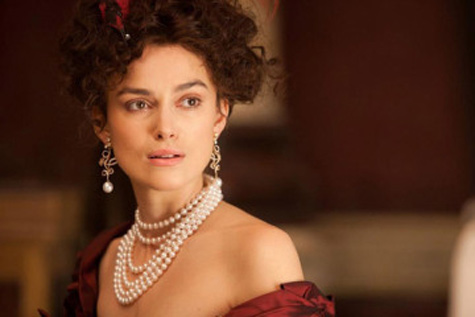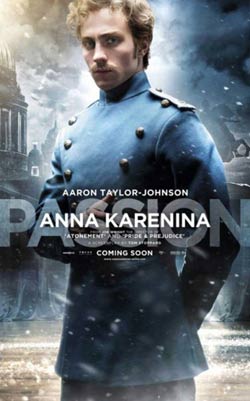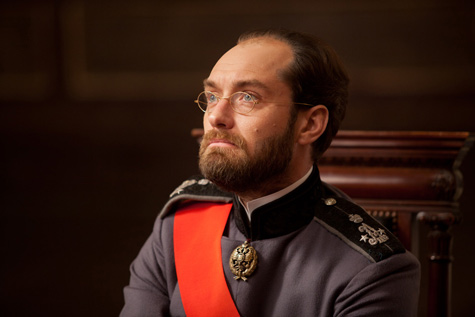
Is it any wonder that so many of us who have read Leo Tolstoy’s Anna Karenina at various stages of our lives feared seeing it depicted in less classical terms? Tolstoy’s novel is considered one of the best books ever written, it is included in 1001 Books You Must Read Before You Die. It’s sacrosanct. But obviously not to screenwriter Tom Stoppard and film director Joe Wright.
It was the casting of Keira Knightley to play the role of the motherly, full bosomed, much loved Anna Karenina that caused me doubt about the longevity of Tolstoy’s famous characters on screen before I even decided to see it.
After viewing the film, I think the casting of Knightley, which I am sure was meant to attract a young audience, was the first step towards character assassination. Stoppard became a serial killer with the casting of Jude Law as Anna’s husband, and Aaron Taylor-Johnson as her lover.
But there was also serious damage to the story itself.
For a cringing start, Stoppard placed Tolstoy’s classic story on a theater stage. Although scenes may begin on the elaborate 19th century stage, they spin away like a rocket ship and enter the expansive world of film and finally there’s the birth of a story.
The problem is the movie doesn’t stay there but returns to the stage setting time and time again. Then you must take off again, and again.
It’s like going through labor pains after you’ve had the baby, again and again.
Stoppard also failed to tell the story as it is written right from the beginning.
“Everything was upset in the Oblonskys’ house,” is the second line in Tolstoy’s book.
Oblonsky, perfectly played by Matthew Macfadyen, was guilty of an “intrigue with the children’s French governess” his wife, Dolly, discovered.
The couple fought for three days. Now, the husband was absent most of the time. The wife was locked in her room crying and planning a divorce. The children were running around unsupervised. Most of the household staff was either missing or had given notice.
In total desperation, Oblonsky summons his sister, Anna Karenina, to urge Dolly to forgive him so his well-ordered life would be restored.
The film, however, does away with all the “upset” and instead, the first scene at the Oblonskys shows a smiling Anna holding a happy child and talking calmly to Dolly about “forgiveness.”
 Then, unsuspectingly, I sat in horror as the Count Vronsky character was assassinated before my eyes with the first glimpse of the very young Aaron Taylor-Johnson.
Then, unsuspectingly, I sat in horror as the Count Vronsky character was assassinated before my eyes with the first glimpse of the very young Aaron Taylor-Johnson.
Tolstoy’s Vronsky is a serious career officer, a mature man, and not a dandy boy toy as played by the strutting Aaron Taylor-Johnson. No offense, he is a good actor, I believed him. But this was not the fully matured, and dedicated officer in whose hands Anna will place her passion, faith and life.
However, the girlish Anna, played by Knightley was, no doubt, well paired with this Vronsky dandy.
When the beautiful Knightley meets Vronsky’s mother on the train, her magnificent face is framed in fur and she offers a toothy Colgate smile so that she seems more a Vogue model than the charming and caring Anna.
Knightley’s too elegant bones also seemed out of place in the lavish Russian ball gowns of the times. Couldn’t Oscar-nominated fashion designer Jacqueline Durran have found some taffeta and lace to cover up her back, along with some nice puffy sleeves?
The pearls wrapped around Knightley’s neck several times and worn in more than one scene were garish and oddly in tune with the heaviness of the film. They symbolized Wright’s and Stoppard’s treatment that weighed down the story choking the life out of it and reducing it too a series of cold symbols, and disconnected scenes.
The manic movements and spastic intensity characteristic of Knightley well served in other films are so out of character for the womanly behavior of the elegant Anna but never more so than on the ballroom dance floor and in the bedroom scenes.

Tolstoy’s vile Karenin virtually kills Anna when he refuses to give her a divorce on religious grounds condemning her to ruination in Russian high society by living out of wedlock with Vronsky.
Karenin threatens Anna and promises she’ll never see their son, Seryozha again if she leaves him. When Anna leaves, he lies to Seryozha telling him his mother is dead.
How cruel can a character get? He took her firstborn son.
But in the film, this character seems to have a heart for Anna. He warns her time and time again that she’ll be a ruined woman if she leaves him. Tolstoy’s Karenin did warn Anna, and did show a little heart, but that was soon forgotten when Anna’s feelings for Vronsky became apparent and gossip ensued, which humiliated Karenin. All his mercy and compassion dried up.
After Anna throws herself beneath a train, Karenin is shown as a kind and forgiving man on screen by taking in Anna’s and Vronsky’s illegitimate child. He is viewed smiling lovingly while watching the little girl romp with her stepbrother in a field of green.
One big happy family. He takes in Anna’s daughter, in the book also, but can he be so changed?
The final blow to Vronsky’s character was also delivered at the end of the film.
Vronsky is so heartbroken and so guilt ridden, Tolstoy tells us, that he sponsors a regiment and goes off to fight in the Orthodox Serbian revolt that had broken out against the Turks. Our last impression of the downtrodden, and honorable Vronsky is that he has nothing left to lose.
The film’s flighty Vronsky, however, will soon be off to another romance with all memories of Anna quickly swept away by his mother and the princess she wants him to marry, so we are inclined to believe.
“I need a drink,” a fellow theatergoer, and complete stranger said to me as we emptied out of The Avon Theater, in Stamford, Connecticut. “But first I’d like to ask for my money back.
“They just destroyed Anna Karenina.”
Dorothy Hayes is the author of Murder at the P&Z, due out in 2013 from Mainly Murder Press. She’s been known to blog at Women of Mystery.
